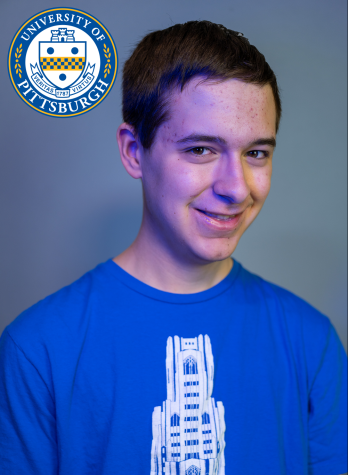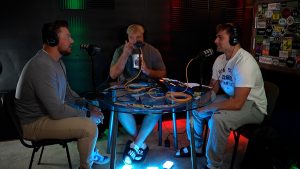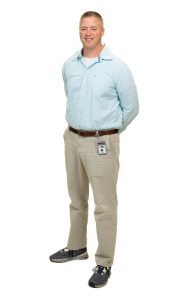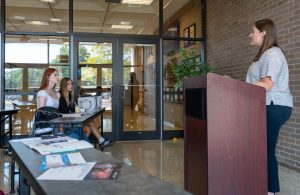Memories of an Amusing Hobby
A love for amusement park history has always defined my personality.
Though I have visited many amusement parks, I owe my passion to Kennywood Park above anywhere else.
May 30, 2023
In 1977, a North Hills amusement park called West View Park closed forever. 35 years after the park’s closure, a seven-year-old boy wandered into his local library’s nonfiction section and pulled a book titled Goodbye, West View Park, Goodbye from the shelf. Though I was unaware of what I had discovered as a first-grader, I had found an impetus to my greatest passion, one that has taken many forms and provided unending joy in my life.

Soon after I checked out the West View Park book, I took home the video about the park’s history that sat next to the book on the library shelf. In the VHS tape titled “Rediscover the Excitement,” the narrator waxes poetic on fond memories of the park, saying that if one listens closely, he or she can still hear the screams of the roller coasters and smell the sweet scent of cotton candy.
As a first grader, I completely believed the narrator, and I told my dad to drive me to the former site of the park so I could hear the supposed ghostly screams of the coasters for myself. To my great disappointment, I heard only the sounds of passing cars when my dad rolled the windows of his car down for me to listen.
Although one of my first experiences in seeking out the history of amusement parks ended in a letdown, the many amazing things that I have experienced over the past decade have more than offset my first-grade disappointment.

I remember the fantastic day my family spent at Canobie Lake Park in Salem, New Hampshire, where a forecast of rain kept the crowds away for the entire day. The park had an attention to detail that I have never seen in any other typical amusement park, with meticulously-maintained landscaping and hand-painted artistic detailing on every ride. One of my best memories of the trip was gliding above the New Hampshire treetops on the Yankee Cannonball wooden coaster, with just enough rain to slick the tracks and send me out of my seat at the top of every hill.

I remember how excited I was to work at Kennywood last year. Among many fond memories, I think of when I first learned to walk around on the Merry-Go-Round while the ride was operating, stumbling into the horses as I tried to find my balance. When I first rang the bell and the ride began to spin, I felt part of a special tradition in the Pittsburgh area, one that is timeless yet rooted in the past. As operators of the Merry-Go-Round, it was also our responsibility to switch the paper rolls that provide the music for the ride on the Wurlitzer band organ. I even helped decorate the organ for Christmas, changing the lightbulbs to seasonal colors and bringing in other decorations to enhance its facade.

I remember my family’s once-in-a-lifetime opportunity to visit Disneyland in California, a trip we had planned in 2020 but had to delay until 2022. When we first entered the park, the driver of the antique fire engine on Main Street USA beckoned us for a ride. The first glimpse of Sleeping Beauty Castle from the fire engine was memorable enough, but as a fan of amusement park history, it was even more special because I was at the only Disney park seen by Walt Disney himself. After the fire engine dropped us off at the central hub of the park, we set out to explore the rest of Disneyland.

I remember my first experience at Lakemont Park in Altoona, PA, when we made the drive to ride the world’s oldest roller coaster, Leap the Dips. After our trip back to 1902, we walked over to the park’s other, larger roller coaster, the Skyliner. Unaware, my family climbed aboard the ride, which earns the title of one of the roughest roller coasters that I have ever ridden. After climbing up the lift hill covered with peeling paint, the ride’s drop felt like you were going down a staircase in a shopping cart, followed by a jackhammer attacking your back. Even so, I loved it.

I remember our eye-opening first visit to Knoebels in 2016, where our last ride of the night was the Skooter bumper cars. Waiting in line, I was amazed to see vintage 1950s bumper cars visibly lift off the floor as they slammed into each other. They made every other bumper car ride look like a kiddie ride by comparison. The ride, which circled a central traffic island, was made more memorable by someone who chose to disobey the “one way only” rule. As he courageously drove opposite the flow of traffic and violently collided with every car going the other direction, the rebel whooped while waving his fist in the air.

I remember days spent in the rain while visiting Waldameer and Kennywood. The experience of diving into the wooded ravine on the Thunderbolt is only accentuated by raindrops piercing your skin like needles. Unlike most people, I left the station, saw there was no line, and decided to go again right away. At Waldameer, my mom and I bounded across the adjacent highway on Ravine Flyer II, again with raindrops pelting our faces. We didn’t realize that we were the only two people on the train until we were already leaving the station.

I remember my formative visits to Conneaut Lake Park, which struggled for years before closing for good. Looking back, the days we spent wandering a nearly deserted midway seem almost like a dream, with the silence only broken by the screams of roller coaster riders. The century-old lakeside hotel with creaking floorboards and the Blue Streak coaster, plunging from the treetops, were both not to be forgotten. The park essentially followed a “ride at your own risk” policy; I remember one person who left the Blue Streak with a nosebleed as a souvenir. Although the pandemic marked the end of Conneaut Lake Park, I am glad that I had the chance to visit as many times as I did.

I remember when I discovered that a small lakeside amusement park was coincidentally down the street from our hotel during a road trip through New York. Even more amazingly, Sylvan Beach Amusement Park had my favorite type of classic amusement park ride: a vintage dark ride. I spent that night taking ride after ride through Laffland, delighted with this untouched time capsule of 1950s haunted houses. Laffland smelled like a combination of grease and a musty attic, with the humming and clicking of the car’s motor adding to the atmosphere. Above any other ride I have ridden, Laffland is a rare treasure, and I hope the clowns stand tall above its facade for years to come.

I remember when my dad and I visited Knott’s Berry Farm, an early theme park just down the highway from Disneyland. The park’s best crown jewels are a log flume and an indoor mine ride from the 1960s, both filled with charmingly simple effects and animated figures. They anchor the park’s Ghost Town area, which also features a train ride. Sitting on the train, I heard the familiar voice of Tony Baxter behind me, famous for designing Disney attractions such as Splash Mountain, Big Thunder Mountain Railroad, and Star Tours. He was kind enough to shake my hand and take a picture with me, and I was ecstatic to meet a famous Disney Imagineer by complete chance.

I remember when I first climbed the staircase to the Racer operating booth at Kennywood. The Racer is one of the few remaining manually-operated roller coasters in America; each brake is controlled by a separate button, and parking the trains requires a certain skill. Just as at the Merry-Go-Round, every ride begins by ringing a bell. With every chime of the bell, I send riders down the Racer’s graceful, swooping drops–direct from the 1920s golden age of the wooden roller coaster–but I am also happy to know that in some small way, I am sending them on a trip back to 1927 that remains relevant today.

I remember the amazing hour spent flying through the trees on Boulder Dash at Lake Compounce, the oldest amusement park in America. Boulder Dash is a unique terrain coaster that scales a New England mountainside, weaving around boulders as it blazes through the trees. Thanks to an event with the National Amusement Park Historical Association, we were granted an hour of exclusive ride time on Boulder Dash after the park closed to the public. From 10 to 11 that night, I didn’t leave the train for 12 consecutive laps around the track. Slicing through the pitch-black trees at 60 miles per hour–with only the lights of the park faintly visible in the distance–is an experience that I will never forget.

I remember my first visit to Funland in Rehoboth Beach, Delaware, where I had the chance to meet the park’s 86-year-old owner, Al Fasnacht. Reading about him in a book on the park’s history, I found him still operating one of the park’s kiddie rides, showing his passion for the park even at such an old age. To my surprise, when I asked him to sign my book, he called another ride operator over to cover him, sat down on a bench, and had a conversation with me and my family. Funland is a family-owned park, a rare place where tickets are still only a few cents and even the largest rides don’t take more than six tickets. It is comforting that at a time when most amusement parks are owned by corporations, there are still some holdouts that prioritize tradition over the bottom line.
More than a hobby, my passion for amusement park history has absorbed every aspect of my life, including work, school, and clearly, my writing. From those early explorations in Northland Library, a simple interest in Kennywood has led me to visit 13 different states, ride 224 unique roller coasters, and devote several days of my life to 35-minute commutes to Kennywood. But my devotion to this passion truly reflects who I am as a person. Whereas some people are known as athletes, artists, or musicians, when my name is mentioned, everyone knows I simply love amusement parks. I wouldn’t have it any other way.














